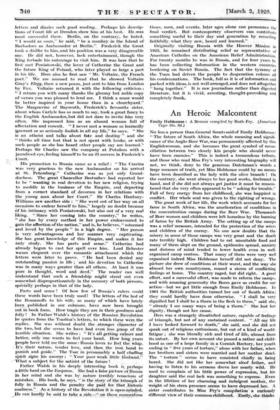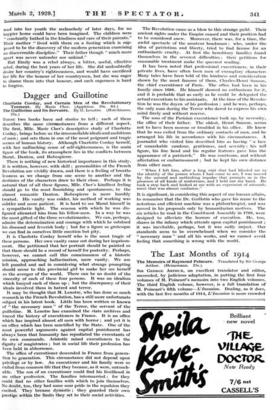An Heroic Malcontent
Emily Hobhouse : A Memoir compiled by Ruth Fry. (Jonathan Cape 10s. ed.) No less a person than General Smuts said of Emily Hobhouse: " The future of South Africa, the whole meaning and signifi- cance of the Anglo-Boer War, was permanently affected by this Englishwoman, and she becomes the great symbol of recon. ciliation between two closely kin people who should never have been enemies." This is indeed a tremendous tribute, and those who read Miss Fry's very interesting biography will not, we think, deny to the generous Dutchman's words a large measure of truth, yet Miss Hobhouse could by no means have been described as the lady with the olive branch ! On the contrary, she went always to her good works, firebrand in hand, and if she did not always get justice it must be remem- bered that she very often appeared to be " asking for trouble." Full of fiery energy from her childhood, she was happiest in conflict. Her whole soul was given to the righting of wrongs.
The great work of her life, the work which accounts for her fame in South Africa, was the amelioration of conditions in the concentration camps during the Boer War. Thousands of Boer women and children were left homeless by the burning of farms by the British Army. The setting up of the camps was a relief measure, intended for the protection of the wives and children of the enemy. No one now doubts that the misery in some of those camps was very great and the death rate terribly high. Children had to eat unsuitable food and many of them slept on the ground, epidemics spread, anxiety and distress of mind tended to lower health even in well- organized camp centres. That many of them were very well organized indeed Miss Hobhouse herself did not deny. The picture she drew of conditions at their worst, and the way she abused her own countrymen, roused a storm of conflicting feelings at home. The country raged, but did right. A great effort, and a successful effort, was made to reform the camps, and with amazing generosity the Boers gave us credit for our action—but we got little enough from Emily Hobhouse. In 1901 the British authorities turned her out of South Africa; they' could hardly have done otherwise. " I shall be very dignified but I shall be a thorn in the flesh to them," said she,
already I see many ways of being a thorn." She lost her dignity, though not her cause.
Hers was a strangely dissatisfied nature, capable of feelings of triumph, but not of any sustained content. " All my life I have looked forward to death," she said, and she did not speak out of religious enthusiasm, but out of a kind of world- fatigue ; she was literally sick and tired of life,- almost from its outset. By her own account she passed a rather sad-child- hood as one of a large family in a Cornish Rectory, her youth ending in " five years of torture," alone with her father, when her brothers and sisters were married and her mother dead. The " torture " seems to have consisted chiefly in being bored. She did not like her somewhat aloof father, and having to listen to his sermons drove her nearly wild, He used to complain of his little power of expression, but his daughter said the real lack was something to express. Even in the lifetime of her charming and indulgent mother, the weight of his stern presence seems to have depressed her. A sister contributes to Miss Fry's compilation a curiously different view of their common childhood. Emily, she thinks read into her youth the melancholy of later days, for no happier home could have been imagined. The children were " constantly bathed in the kindness and care of their parents." Their mother " lived with them on a footing which is sup- posed to be the discovery of the modern generation exercising no discoverable discipline." Their father though much more apart was never untender nor unkind."
But Emily was a rebel always, a bitter, useful, effective rebel, during the best years of her life. She did undoubtedly desire her country's righteousness, and would have sacrificed her life for the honour of her countrymen, but she was eager to shame them into that honour,- and such eagerness is hard to forgive.

























































 Previous page
Previous page